Fire safety of gas equipment: norms and rules for the operation of gas appliances
The necessary norms and rules for the operation of gas appliances are often not followed, since most users do not fully possess the necessary knowledge and skills. This is evidenced by the fact that owners use hundreds of thousands of faulty gas appliances. And they do not think about the impending danger.
Agree, it’s a shame to suffer from the consequences of a gas leak or due to a faulty gas appliance. But it’s not difficult to correct the situation - you should start by studying the rules that will significantly reduce the likelihood of situations dangerous to life and health. In this article we will talk about what the fire safety of gas equipment is and what standards must be observed when operating various gas-using appliances.
The content of the article:
Safety rules for every day
Before any use of a gas appliance, a number of mandatory steps must be performed.
Namely, it is necessary:
- Make sure there is no smell of gas.
- Check for traction. It should be remembered that its absence is a direct threat to life.
- Open the window. Modern metal-plastic products can be set to ventilation mode. Which should occur during the entire combustion process of the energy carrier.
- Monitor the operation of the gas appliance.That is, you should not leave operating equipment unattended.
- Turn off the taps of the gas appliance when there is no longer a need to use it.
You should also remember that the electric hood placed above the gas stove must be turned on before the gas combustion process begins. If the sequence is not followed, then you should refrain from using the specified equipment.
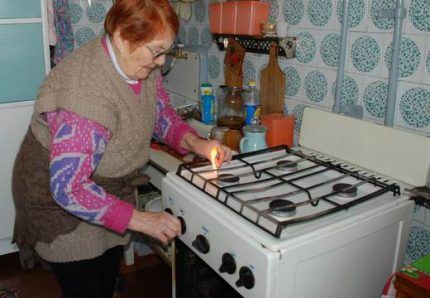
What to do if there is a gas leak?
The formation of a gas-air mixture in a room is a fire and explosion hazard. And often leads to sad consequences. Therefore, once a leak is detected, appropriate measures must be taken.
The presence of danger is determined by the characteristic odor of “blue” fuel (special substances - odorants - with a strong unpleasant odor are added to the gas to make it easier for users to notice a leak). Also, for safety reasons, you can install a special device that detects gas leaks - sensor.
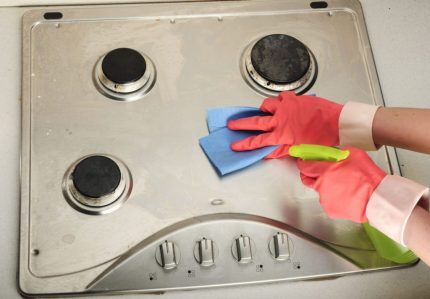
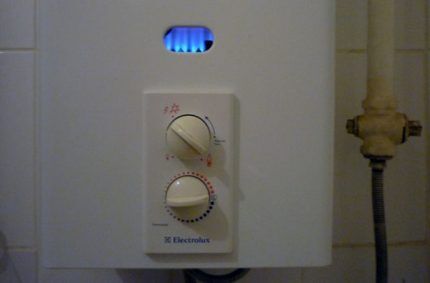
Leaks most often occur in the area of gas distribution connections, as well as taps.
Having identified the smell of fuel, it is necessary to perform a number of actions, namely:
- Turn off the taps of gas appliances (if they are open).
- Organize ventilation of the room. This means opening windows and doors to ensure air exchange. At the same time, it is prohibited to turn on electric hoods and use other electrical appliances, lighters, and lighting fixtures.
- Leave the room where a leak is detected. But, if there are other people in the danger zone, then it is necessary to notify them and warn them of the need to take precautions.
- If necessary, organize evacuation. There is no need to use electrical devices (for example, bells, telephones). That is, to wake up the residents of a neighboring apartment, you just need to knock, and not press the bell button.
- Notify the city gas service on duty by calling 104 (04). But you should remember that the call can only be made in a safe place, which is not a room saturated with gas.
Special services employees can arrive to fix a leak at any time of the day. And they must be allowed into the required building or premises.
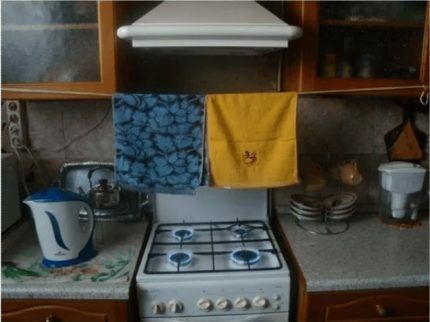
Having identified a leak and/or discovered a malfunction that may lead to a leak or has already led to it, you must call the gas service. How to take other necessary measures. Otherwise, you can pay a fine of 1-2 thousand rubles (according to Article 9.23 Code of Administrative Offenses of the Russian Federation). And this is the case if everything went without consequences and there was no threat to the lives of citizens, and the mistake was made for the first time.
The necessary measures should be taken regardless of where the characteristic smell of fuel is detected - indoors, outdoors, or in other places. That is, the procedure is the same for all situations.
When you detect the smell of gas, you don’t need to reassure yourself with thoughts that it is not strong. Since explosions with possible subsequent fire occur precisely at a low concentration of “blue” fuel, when it does not exceed 5-15% of the volume of the room. And at a higher value, the fuel simply burns.
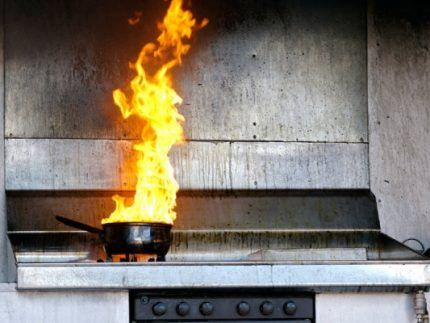
In case of incorrect operation of gas appliances or problems with wiring that threaten the formation of a gas-air mixture, the owner must organize their repair and, if necessary, replacement.
If the owner of the premises or building will be absent there for a long period of time, it is necessary to contact Gorgaz (raygaz) to turn off the gas supply. Which is one of the measures to prevent energy leaks.
Rules for using gas appliances
Since this equipment comes in different types, you should know the features of safe operation of each of them.
Type #1 - gas stoves
Only people who have undergone special instructions on safe use have the right to use a gas stove.
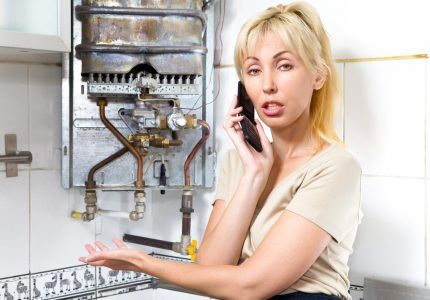
The rules themselves state that:
- the owner must keep his stove clean and, most importantly, in good condition;
- before turning on the stove, you must make sure that all its taps, as well as the tap in front of the appliance itself, are closed, and the windows in the room must be open;
- First, you should bring the flame source to the desired burner, and then open the stove tap;
- the color of the flame should have a bluish-violet (green) tint, the flame height should be on average 2-2.5 cm (it should respond to changes in the position of the tap handle).
If signs of malfunction are detected or the flame begins to change color from blue to any other, while it smokes, then the stove must be turned off immediately.
Since there are facts of incomplete combustion of gas, which leads to the formation of a fire and explosive gas-air mixture in the room. A smoky flame indicates that carbon monoxide is accumulating. Which, under certain conditions, can also burn.
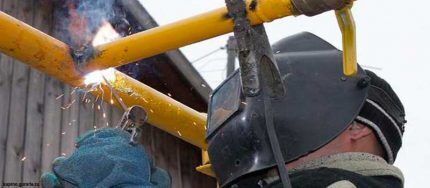
Carry out repairs yourself maintenance, inspection of gas stoves, there is no need to make changes to their design. The same applies to replacement and transfer.
Any malfunction or signs of incorrect operation of the equipment must be immediately reported to the gas service.
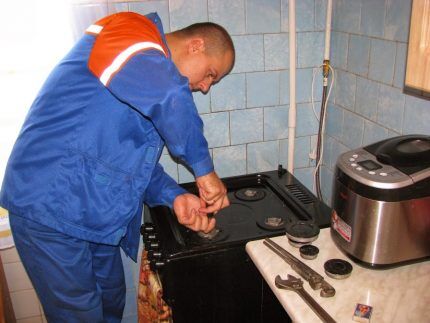
It is necessary to check the serviceability of the device regularly (recommended periods are indicated by the manufacturer in the instructions for the specific model of gas equipment). What should the specialists of the gas service do, with whom you need to conclude service contract.
Type #2 - gas-fired boiler
To avoid energy leakage and fire, any heating device can only be used if there is draft. Which should be checked before turning on, and also a few minutes after starting use.
Only a working gas boiler may be used for operation. The same rule applies to his automation. In addition, to prevent fire hazards, a number of other recommendations should be followed.
Namely:
- the window must be open during boiler operation, and its presence in the room that is used as a combustion chamber is a prerequisite; we recommend that you familiarize yourself with the requirements for gas boiler room ventilation;
- before ignition, the gate (limiting valve) should be opened;
- regularly monitor the current condition of the chimney, since normal freezing can cause the accumulation of carbon dioxide in the room.
Before the start of each season, the owner of a gas boiler is required to carry out work to prepare it for operation. Which should include monitoring the condition of ventilation and smoke removal systems. And if there are foreign objects there, dirt should be cleaned, since the same soot quite often causes fires.
In addition, it is necessary to check and promptly eliminate violations of the integrity of the chimney.
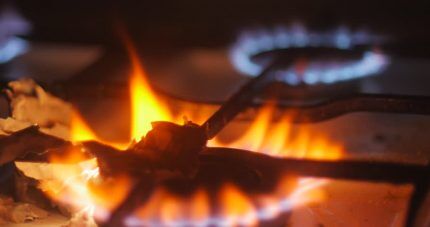
Fire safety measures during the operation of existing gas appliances will be incomplete if the entry points of all kinds of communications through the foundations of buildings are not sealed. The reason is that gas can penetrate into the building through the resulting gaps, cracks, and splits (in cases of leakage from underground pipelines).
If the thrust is not stable, then you need to remember that phenomena such as fog, strong wind.
Type #3 - gas oven
Gas furnaces are similar in operating principle and design to boilers.As a result, the rules for safe use, risks and causes of fires for both types of equipment are identical. You can familiarize yourself with them in the previous section of the article.
Type #4 - instantaneous water heater
The room in which the specified instantaneous gas water heater (column) is located must be equipped with a window and an exhaust hood located near the ceiling.
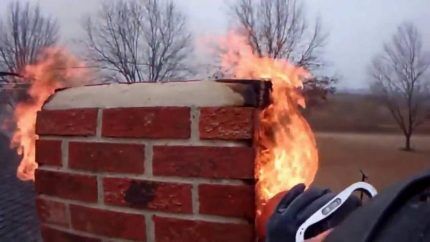
An important fire-fighting measure in this case is regular monitoring of the presence of draft. What should be done before turning on the water heater and 3-5 minutes after.
The test is performed using a lit match, which must be brought to a special hole. If everything is in order with the draft, the flame will be drawn into the protective casing.
When heating water, it is imperative to control its temperature. That is, you should not leave the room with the device. How to keep the igniter in working position for a long time.
In addition, the column is one of the most problematic gas appliances. Therefore, it should not be turned on idle. You can only use a working water heater with correctly working automation. Moreover, there should be no traces of external damage.
Type #5 - gas cylinders
The specified type of equipment - gas cylinders - cannot be used if there are any malfunctions.
It is important to always remember that it is strictly forbidden to use fire or electrical appliances when replacing an empty container with a full one.

Cylinders should be installed no closer to:
- half a meter from the gas stove;
- meters from any heating device;
- if the heating device is open, then the distance to the cylinder increases to 2 meters.
It is allowed to store cylinders outside, but to do this you need to use a metal cabinet with ventilation holes.
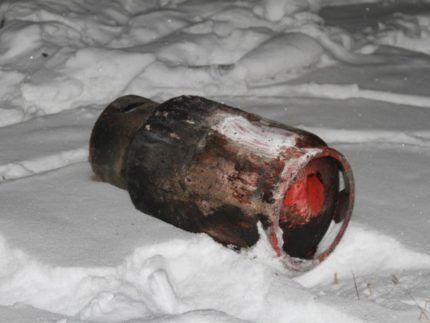
We also must not forget that even if all rules and recommendations are followed, gas cylinders will always be a source of danger. Therefore, if possible, you should refuse them.
We recommend viewing the detailed recommendations for using cylinders at home.
Safety precautions when using the chimney
This device should provide stable traction in any operating modes of gas appliances. But in difficult weather conditions, even a working smoke removal system can lose efficiency.
And in some cases it even occurs reverse thrust. Which sometimes causes fires.
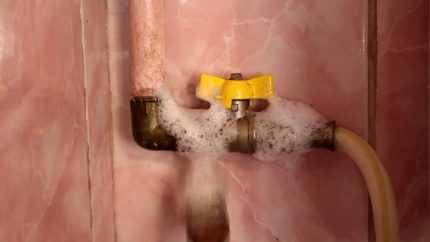
Therefore, in heavy snowfalls, fog, freezing, and rain, especially careful control of the presence of draft is required, and you also need to monitor the combustion process.
In addition, the following can lead to a decrease in the efficiency of smoke removal and an increase in fire danger:
- ineffective supply ventilation;
- hermetically closing windows and doors, which disrupts air exchange;
- unauthorized connection of additional gas appliances, which increases the load on the chimney, which it may not be able to cope with.
If signs of ineffective removal of combustion products are detected, it is necessary to report this to representatives of the City Gas Agency or another specialized organization.
And also, owners of gas equipment must promptly provide access to specialists to check operation chimney.
General fire safety rules
Consumers are required to stop using any appliance once signs of malfunction are detected. This is especially true in situations where a gas leak is detected.
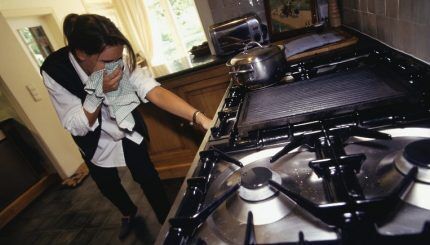
It is prohibited to disable automatic safety and regulation when using gas equipment.
And also you can’t:
- block access to the gas riser taps or complicate it in any other way;
- use smoke removal systems, ventilation after the validity period of the cleaning certificate has expired;
- arbitrarily change the layout of gas equipment;
- prohibit employees of city gas companies from performing any work (some of them can be carried out at any time of the day);
- allow preschool children to operate any gas appliance and children must not be left unattended in the room where this equipment is located;
- store empty or full liquefied gas cylinders indoors or in basements.
Do not bend or twist rubber-fabric sleeves. If their outer layer is damaged, the product should be replaced. Otherwise, fuel leakage will begin after some time.
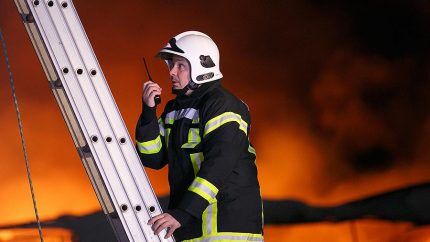
It is prohibited to heat any premises using gas stoves and other appliances not intended for these purposes. Place flammable substances and liquids near them.
The standards and recommendations listed in the article are prescribed in the Fire Safety Standards NPB 01-93, put into effect by order of the Ministry of Internal Affairs of the Russian Federation of December 6, 1993 N 521.
Conclusions useful video on the topic
The first video will help you better understand how to detect gas leaks using available materials.
The following video will help you learn how to identify problems by the color of the gas flame.
Correct actions when detecting the characteristic smell of gas in a room will help prevent a fire. What exactly needs to be done is outlined in the following video.
Today, fire safety during the operation of any gas equipment is the responsibility of every consumer. Since users are personally responsible for the good condition of their stoves, boilers, cylinders. And this must be taken responsibly.Otherwise, minor and major troubles are inevitable, and in severe cases, complete or partial destruction of buildings, premises and even human casualties.
Would you like to supplement the above material with recommendations for the safe operation of any gas appliance? Or do you still have questions that we have not addressed in this material? Write your comments, ask questions, participate in the discussion - the feedback form is located below.
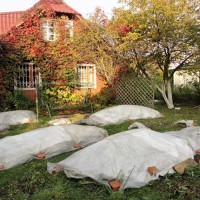


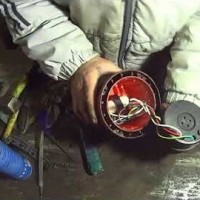
It seems to me that the recommendation for checking draft with a flame is that a flame is not necessary. It’s safer to use a device or a piece of newspaper